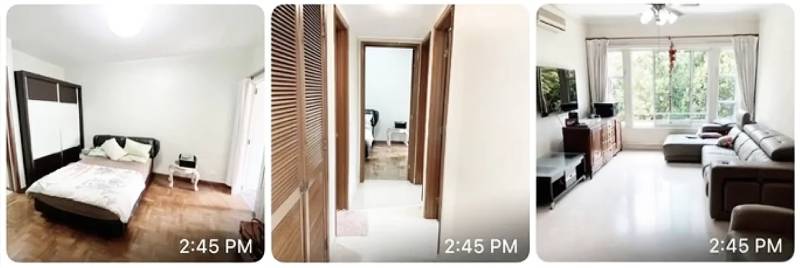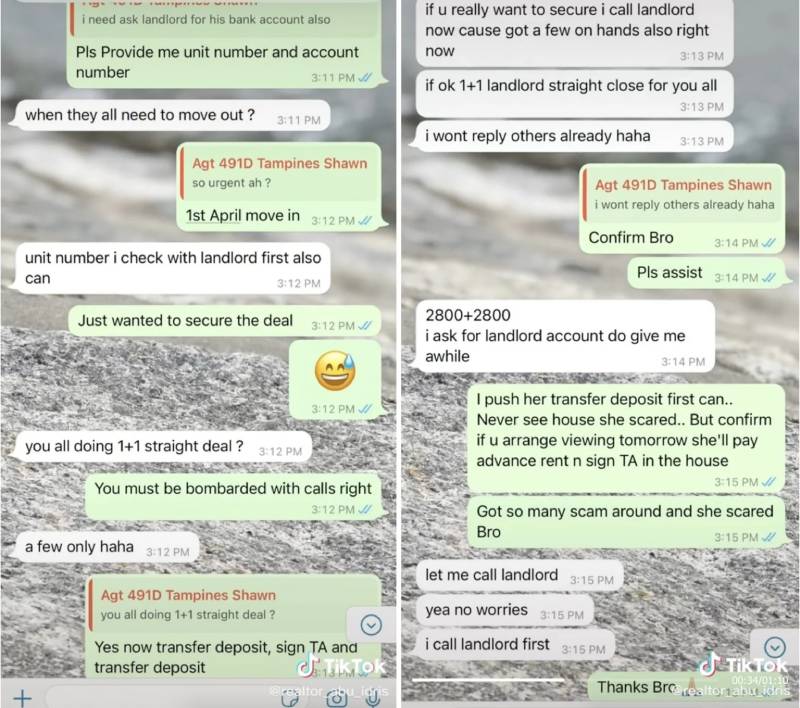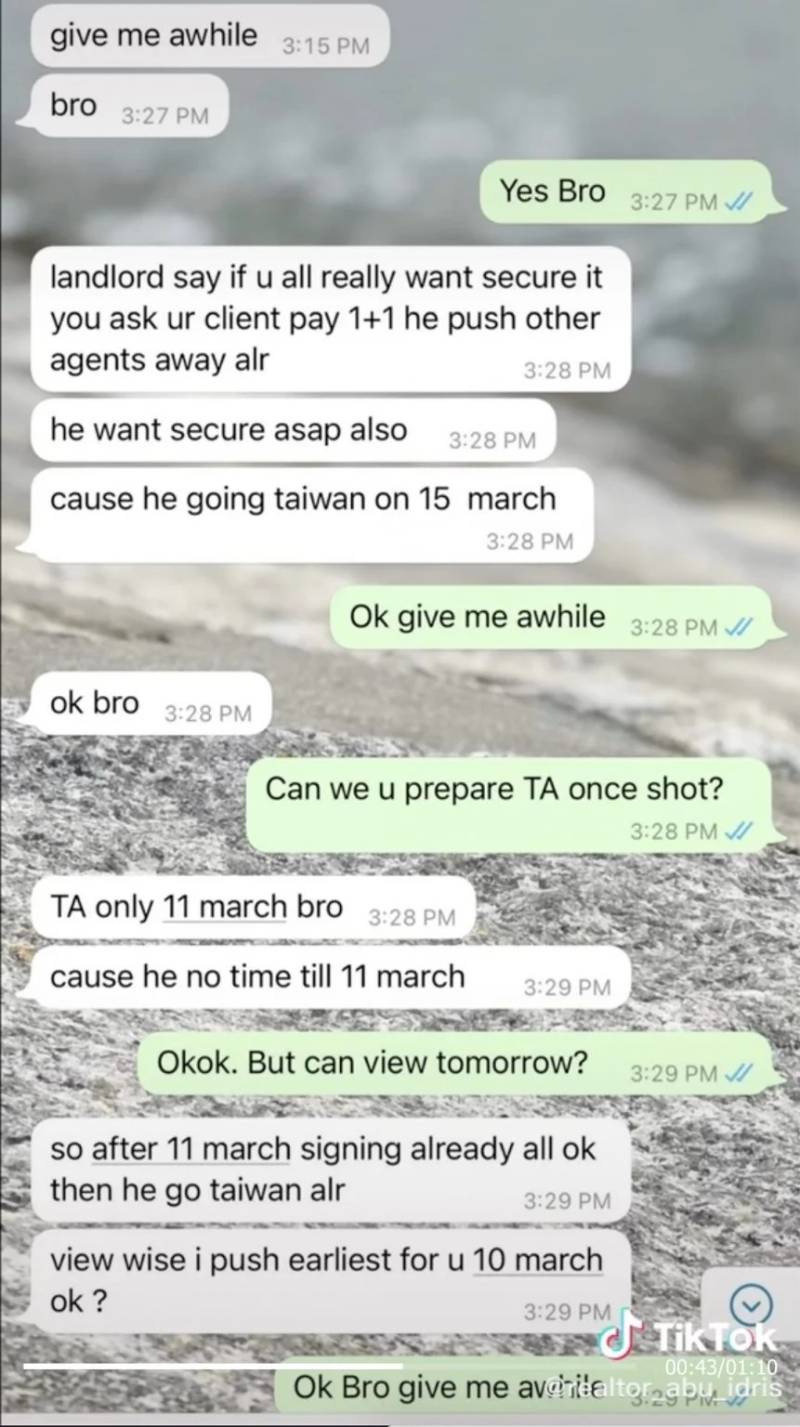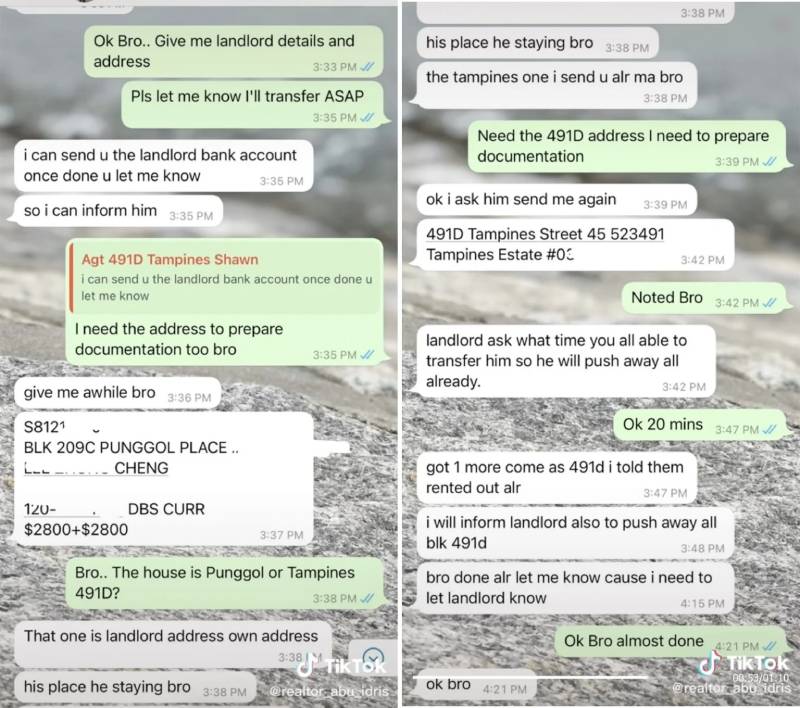Property agent busts rental scam in viral TikTok video

Rental scams are not a new ruse in Singapore. However, as more turn to sourcing for rental apartments through online portals, there’s been more opportunities for unscrupulous individuals to prey on unsuspecting people looking for a home.
In this case, property agent Abu Idris managed to nab one such scammer, revealing their entire conversation thread on his TikTok account. His viral video has since amassed over 94k views at the time of writing.
@realtor_abu_idris Rental Scam Alert, Police complain made. Beware Tenants, Ad still active.Claims to be Agent, Uses Real pictures from other listings. #tiktok_sg #scam ♬ Suspicious, slow and simple song - Kohrogi
Abu responded to a listing found on RentInSingapore, a website where people can find rentals or lease their place out for rent. The scammer was posing as a property agent helping his client list their flat online.
In Abu’s initial message, he messages the scammer as a tenant’s agent to secure a flat for his clients, stating his client’s profile and asking to view the unit.

The scammer responds immediately with photos of the house, telling Abu that many people are interested in the unit and that it was newly renovated.
From this point onwards, the red flags start going up. Looking at the pictures, it is apparent that the unit isn’t a HDB flat from the windows in the living room.

Abu continues to play along with the scammer by confirming the move-in date and that the apartment was fully furnished.

Here, the scammer tries pushing for a one-plus-one deal, which is a total of two months’ deposit. Since one month’s rental is $2,800, that works up to $5,600. Usually, if the rental is only for a year, just one month’s deposit should be given, instead of two.
Pressure tactics are also used, with the scammer telling Abu that other people are looking to close on the flat. This is especially effective if tenants are desperate for a place to stay and wants to close the deal quickly in fear that they would lose out on a well-renovated apartment at a good price.

More pressure is applied — the scammer smells blood in the water, and he’s moving in for the kill. He even says that the landlord is going overseas to Taiwan and wants to secure a tenant as soon as possible.
Abu wants to view the property and sign the Tenant Agreement (TA), but the scammer buys time and pushes the date.

Finally, the scammer gives the full address of the Tampines rental unit. Using this, Abu is able to verify ownership proof through the Inland Revenue Authority of Singapore (Iras) website.

With this, Abu immediately registers a police report against the scammer. Even so, the scammer appears remorseless and is unrepentant for running a scam on unsuspecting people.

In April last year, a woman listed her home for rental and cheated victims out of over $10,000 in rental deposits and payments, with zero intention of renting out her flat.
Another case involved a man listing a room in his flat on Carousell, collecting over $17,000 from eight victims before getting caught. Some of his victims did not even realise it was a scam until the police contacted them.
Scammers always use photos of well-renovated and well-furnished homes to lure tenants in. Some even going as far as ripping off legitimate listings and re-listing it with a lower price on other platforms. If the ‘agent’ makes excuses and tells you the unit can only be viewed from the outside, it’s most likely a scam.
Just because you’re under pressure to find an apartment doesn’t mean you should rush into making a deposit before signing any documents. No document? No deal.
After all parties have signed the relevant documents, issue your initial deposit directly to the landlord. Always use a cheque or bank transfer so if anything goes south, you’ll have records on hand to get your money back. There are two ways to check property ownership:
On 99.co, all listings are regulated and by agents registered with the Council for Estate Agencies (CEA). Engaging an authorised agent to help you on your search for a rental apartment isn’t an absolute necessity. However, doing so enables you to safeguard your interests, especially if you’re a first-time renter.
If you’re unsure about the nuances of engaging an agent, CEA has some useful guides on what to note when engaging a property agent in a rental transaction.
READ ALSO: Experts: Never scan a QR code sent to you
This article was first published in 99.co.